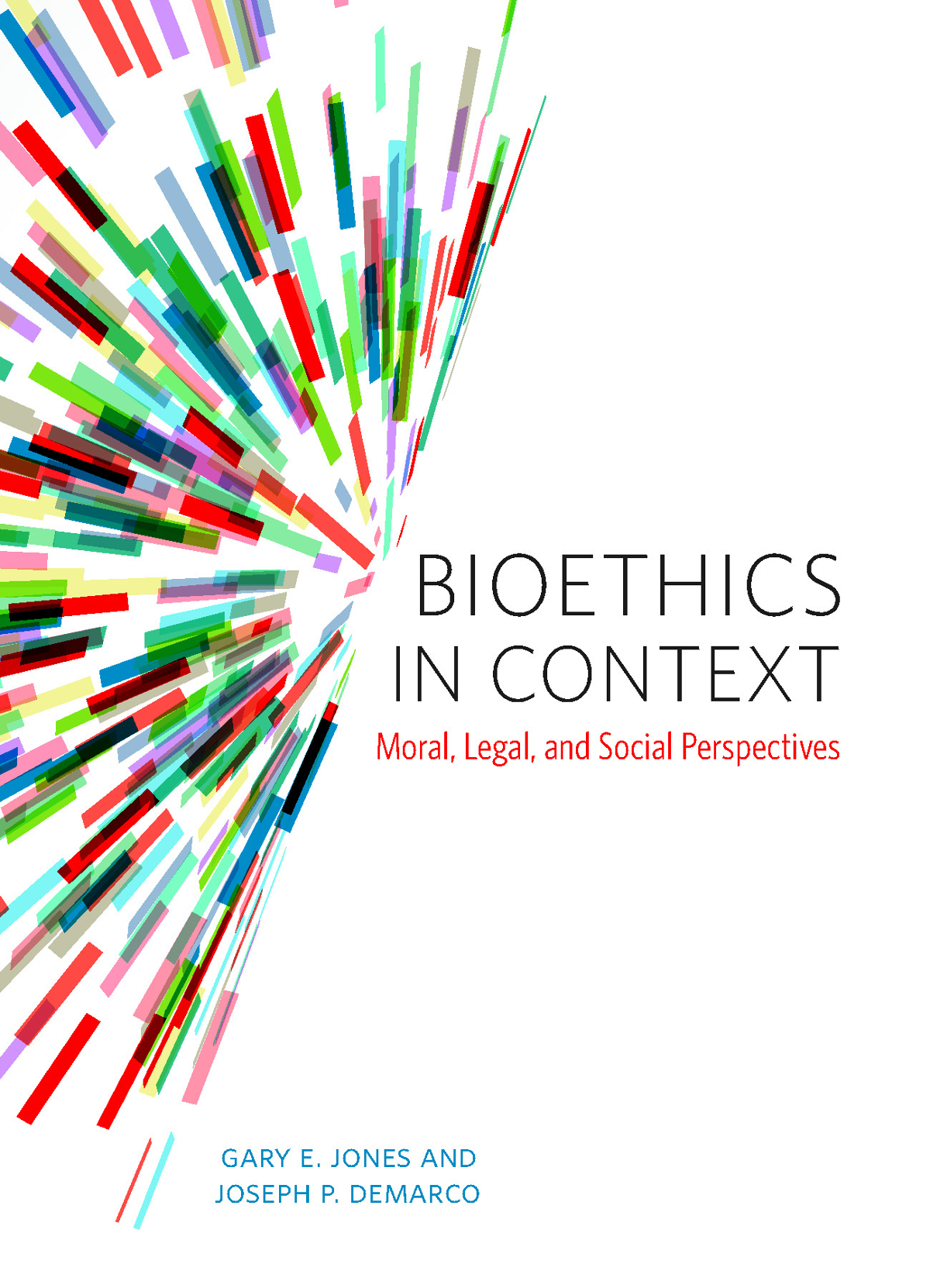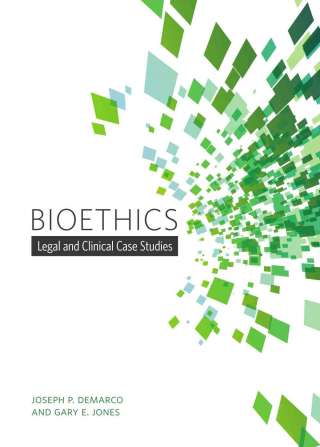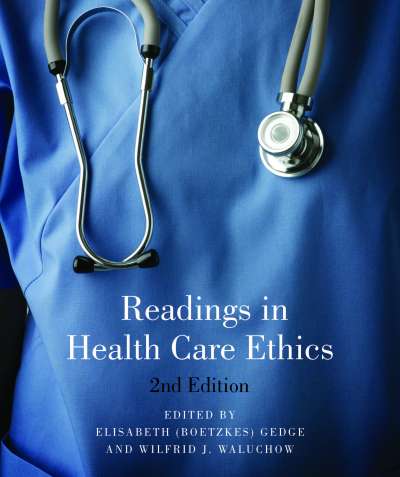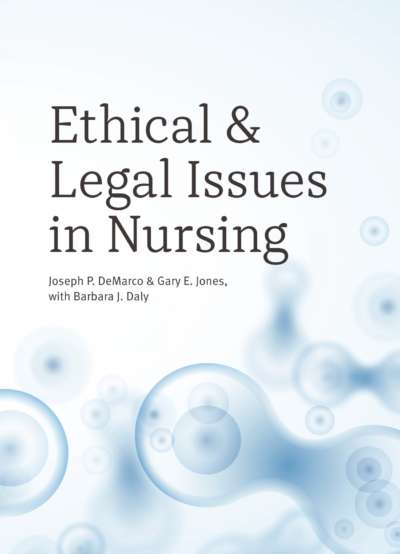This book focuses on American health care ethics and law; if you’re looking for a health care ethics text with a Canadian focus, you might want to consider Readings in Health Care Ethics 2e or Well and Good 4e.
In Bioethics in Context, Gary Jones and Joseph DeMarco connect ethical theory, medicine, and the law, guiding readers toward a practical and legally grounded understanding of key issues in health-care ethics. This book is uniquely up-to-date in its discussion of health-care law and unpacks the complex web of American policies, including the Patient Protection and Affordable Care Act. Useful case studies and examples are embedded throughout, and a companion website offers a thorough, curated database of relevant legal precedents as well as additional case studies and other resources.
Bioethics in Context can be used on its own, or packaged with Bioethics: Legal and Clinical Case Studies for a discounted price or packaged with The Ethics of Pandemics for an additional $10. Please contact customerservice@broadviewpress.com for more information.
Comments
“This is a terrific, highly engaging introduction to bioethics. It gives practitioners and students of medicine, nursing, and law the language, theoretical background, and basic legal knowledge to join the conversation about important contemporary problems in bioethics, and it includes plenty of practice thinking through knotty problems.” —Michelle M. Mello, Stanford Law School
“Bioethics in Context is a welcome book for bioethics instructors. Most bioethics issues are inextricably tied to legal concerns, so they cannot be understood without an appreciation of the current laws. This text is unique in its recognition of the importance of this relationship. It addresses the ethical and legal issues together, providing a robust understanding of the topics. The authors have done an admirable job of making both ethics and the law accessible for students.” —Joan McGregor, Arizona State University
“Bioethics in Context should be enthusiastically received by teachers of biomedical ethics. Gary Jones and Joseph DeMarco provide up-to-date coverage of all the principal issues in the field, masterfully discussing the main positions, arguments, and contributors to current debates. The authors provide a wealth of concrete case studies and emphasize how ethical, legal, and social norms intersect and sometimes conflict. Highly recommended.” —David Svolba, Fitchburg State University
Acknowledgments
Introduction
Chapter 1: Moral Theory in Bioethics
- Consequentialism and Deontology
- Consequentialism
- Rule Consequentialism
- Hare’s Utilitarianism
- Kantian Deontology
- Rule Theory
- Case Study: Dr. Mando
- Alternative Approaches
- Principlism
- Particularism
- Virtue Ethics
- Feminist Ethics and the Ethics of Care
- Casuistry
- Conclusion
- Exercises and Discussion Questions
Chapter 2: Basic Law
- The American Legal System
- Common Law
- Statutory Law
- Executive Orders and Agencies
- Constitutional Law
- State Court Systems
- The Federal Court System
- Legal Processes and Lawsuits
- Ethics and the Law
- Conclusion
- Exercises and Discussion Questions
Chapter 3: Justice and the Right to Care
- The Meaning of Justice
- Justice and Equality
- Equality of Resources: Ronald Dworkin
- Group Equality: R.H. Tawney
- Complex Equality: Michael Walzer
- Criteria of Just Distribution
- Theories of Justice
- Utilitarian Theory
- Social Contract Theory
- Libertarian Theory
- Feminist Ethics and Just Health Care
- Norman Daniels’s Approach to Health-Care Justice
- Just Health Care: Beauchamp and Childress
- Allocation of Health Care
- Models for the Allocation of Health Care to Individuals
- The Proprietary Model
- The Merit Model
- The Social Worth Model
- The Need Model
- Policy Options for the Allocation of Health Care
- Fee-for-Service Model
- The Universal and Comprehensive Provision of Benefits Model
- Fee-for-Service with a Safety Net Model
- Universal Basic Health-Care Model
- Professional Considerations
- Containment of Health-Care Costs
- Rationing of Health Care
- Patient Protection and Affordable Care Act
- The PPACA and the Iron Triangle
- Accessibility
- Quality
- Cost
- Concerns about the Viability of the PPACA
- The PPACA and the US Constitution
- Expansion of Medicaid
- Individual Mandate
- Ethical Aspects of the Individual Mandate and Medicaid Expansion
- Conclusion
- Exercises and Discussion Questions
Chapter 4: The Duty to Treat
- Physicians and Other Health-Care Providers
- In General, No Duty to Treat
- Duty Not to Abandon
- Is There a Moral Duty to Treat?
- Standards of Care
- Malpractice
- Good Samaritan Laws
- Hospitals
- Medicare
- Medicaid
- Emergency Treatment
- Staff Physicians
- Nurses
- Rights and Duties of Third-Party Payers
- ERISA: Employment Retirement Income Security Act
- Conclusion
- Exercises and Discussion Questions
Chapter 5: Informed Consent
- The Basics of Informed Consent
- Three Concepts of Informed Consent
- Elements of Informed Consent
- Disclosure
- Waiving and Delegating Informed Consent
- Proxy Decision Making
- Advance Directives
- Assessing Capacity
- The Meaning of Decisional Capacity
- Mental Illness and Capacity to Consent
- Enhancing Capacity
- Capacity: Young and Old
- Religion and Capacity
- Does Rejection of Treatment Indicate Incapacity?
- Erring on the Side of Autonomy
- Assessing Capacity
- Informed Consent: Ethical Issues
- Constraints on Informed Consent
- Coercion
- Manipulation
- Offers and Rewards
- Influence
- Medical Paternalism
- Autonomy vs. Beneficence
- Ethical Evaluation of Informed Consent
- Informed Consent and Ethics Committees
- Informed Consent: Legal Issues
- The Scope of Informed Consent
- Community of Physicians Standard
- Reasonable Physician Standard
- Objective Patient Standard
- Subjective Patient Standard
- Three Exceptions to Informed Consent
- Incompetency
- Emergency Care
- The Therapeutic Privilege
- Legal Consequences of the Failure to Obtain Informed Consent
- Revising Informed Consent
- False Imprisonment
- Special Problem Areas
- Conclusion
- Exercises and Discussion Questions
Chapter 6: Informed Refusal and the Discontinuation of Treatment
- The Criteria for and Meaning of Death
- Persistent Vegetative States
- Religious Objections to the Brain-Death Criterion
- Medical Futility
- What Is Medical Futility?
- Physiological or Strict Futility
- Quantitative Futility
- Qualitative Futility
- Case Studies of Medical Futility
- Are Wanglie and Baby K Cases of Medical Futility?
- Who Decides?
- What Is the Chance of Success?
- Policies on Futility
- The AMA Policy
- The Texas Statute
- Discontinuing Medical Treatment
- Determining Whether to Discontinue Treatment
- Family Consent
- Substituted Judgment
- Best Interest Standard
- Mixed Standard: Limited Objective Test
- Withdrawing versus Withholding Treatment
- Passive Euthanasia
- Active Euthanasia and Physician-Assisted Suicide
- The Ethics and Laws of Assisted Suicide
- Ethical and Legal Foundations of Informed Refusal
- The Ethics of Informed Refusal
- Legal Foundations of Informed Refusal
- Karen Quinlan: Privacy and Treatment
- Nancy Cruzan: Clear and Convincing Evidence
- Elizabeth Bouvia: Do Motives Matter?
- Removing Respirators versus Removing Feeding Tubes
- Other Cases: Schiavo and Borenstein
- Treatment Decisions Involving Children
- Birth Defects and Treatments
- Parental Autonomy and Mandated Treatment
- Refusal of Treatment for Religious Reasons
- Conclusion
- Exercises and Discussion Questions
Chapter 7: Nursing: Legal and Moral Issues
- What is Nursing?
- Licensure and Credentialing
- Nurse Practice Acts and Nursing Boards
- Standard of Care
- Nurses and Conscience Clauses
- The Limits of Nurses’ Responsibilities
- Nurses and Diagnoses
- Whose Obligation: Nurse’s or Physician’s?
- Nurses Practicing Medicine?
- Advocating for a Patient
- Boundary Violations
- Nurses in Emergencies
- Some Particular Duties and Obligations
- Nursing Assessment
- Acquiring Informed Consent
- Duty to Protect against Patient Self-Harm v
- Duty to Warn Third Parties
- Reporting Suspected Child Abuse
- Conclusion
- Exercises and discussion questions
Chapter 8: Privacy and Confidentiality
- Privacy
- Privacy as a Moral Rule
- Utilitarian Justifications for Privacy
- Covert Surveillance
- The Legal Right to Privacy
- The Right to Privacy of Conduct
- The Right to Privacy of Information
- Confidentiality
- The Physician–Patient Relationship
- The Physician’s Obligation of Confidentiality
- HIPAA Regulations
- Maintaining Confidentiality
- Other Legal Exceptions to Confidentiality
- Evaluating the Tarasoff Case
- HIV and the Law
- Duty to Warn of Genetic Risk
- Conclusion
- Exercises and Discussion Questions
Chapter 9: Cultural Competency
- The Importance of Cultural Competency
- Reasons in Support of Cultural Competency
- Medical Diagnoses and Cultural Difference
- Reacting to Patients: Responding to Differences
- Respecting Differences and Negotiating Biases
- Responding to Patient Biases
- Not All People in Any Culture Are the Same
- Whose Culture Dominates?
- The Initial Encounter with Patients
- Cultural Competency and Informed Consent
- Cultural Competency and Informed Refusal
- Cultural Competency and Translation
- Translation and the Law
- When Culture Conflicts with the Law
- Deciding to Report
- Balancing Moral and Legal Obligations
- The Affordable Care Act
- Conclusion
- Exercises and Discussion Questions
Chapter 10: Issues in Human Reproduction
- Abortion
- Fetuses and Personhood
- Philosophical Perspectives on Abortion
- Legal Aspects of Abortion
- The Legal Status of the Fetus
- In Vitro Fertilization
- Surrogate Motherhood
- Involuntary Sterilization
- Genetic Testing and Treatments
- Genetics and Disease
- Genetic Testing
- Preimplantation Genetic Diagnosis
- Genetic Enhancements
- The Stem-Cell Debate
- Human Cloning
- Cloning to Produce Children
- Cloning for Research Purposes
- Conclusion
- Exercises and Discussion Questions
Chapter 11: Mental Illness
- What is Mental Illness?
- Commitment, Consent, and Decision Making
- Institutional Commitment and Consent
- Treatment Decisions
- Incompetence
- Legal Responsibilities and Liabilities
- Malpractice
- Duties to Third Parties
- Conclusion
- Exercises and Discussion Questions
Chapter 12: Medical Research: Clinical Trials
- What are Clinical Trials?
- Protecting Research Subjects
- Historical Abuse
- The Belmont Report
- The Declaration of Helsinki
- Placebos
- Types of Clinical Trials
- Phase I Trials
- Phase II Trials
- Phase III Trials
- Protocols
- Clinical Equipoise
- Participation in a Clinical Trial
- Federal Regulations
- Legal Issues in Clinical Trials
- Abney, et al. v. Amgen Inc.
- Grimes v. Kennedy Krieger Institute, Inc.; Myron Higgins, A Minor, Etc., et al. v. Kennedy Krieger Institute, Inc.
- Kristina Ann Dahl, MD, et al. v. HEM Pharmaceuticals, Inc., et al.
- Estate of Kevin Baker v. University of Vermont
- Greenberg, et al. v. Miami Children’s Hospital Research Institute, Inc., et al.
- Conclusion
- Exercises and Discussion Questions
Chapter 13: Transplantation Ethics
- Organ Donation
- Evaluating Prospective Organ Recipients
- Selling Organs
- Live Donors
- Donors Lacking Competence
- Donations against One’s Will
- Prisoners as Organ Donors
- Conclusion
- Exercises and Discussion Questions
Index
Index of Court Cases
Index of Statutes
Index of Model Acts
Gary E. Jones is Professor of Philosophy at the University of San Diego and a member of the California Bar Association.
Joseph P. DeMarco is Professor Emeritus of Philosophy at Cleveland State University.
This book has two companion websites: one intended for students and other readers, and one available exclusively to instructors teaching the book in a course.
The instructor resource site offers supplemental questions and teaching notes. An access code to the website is included with all examination and desk copies of the book. If you are a course instructor and would like to access the site but have lost your code, please contact us at customerservice@broadviewpress.com.
The student resource site provides useful additional material for students, general readers, and practitioners of bioethics. It includes:
- • A comprehensive collection of over 200 legal cases, organized in accordance with the book’s chapters and topics; these cases will be especially useful to those who wish to examine a specific topic in greater detail for the purposes of a paper or other research project
- • Selected and edited bioethics state codes for each of the 50 states
- • An “Ethics Digest” containing encyclopedic entries on additional topics in ethical theory and bioethics, such as prima facie duties and social contract theory
- • A collection of interactive case studies in which the reader analyzes realistic scenarios through a series of multiple choice questions
- • PowerPoint slides highlighting key concepts and themes
Access to this website is included free with every new copy of Bioethics in Context. Access can also be purchased separately here.
For Chapter Eight: Privacy and Confidentiality from Bioethics in Context, click here. (opens as PDF).












